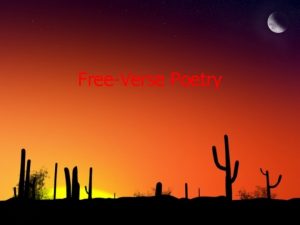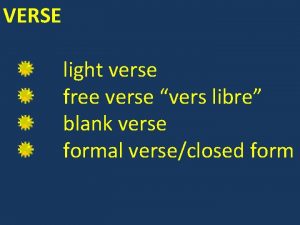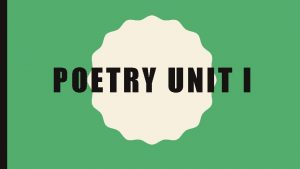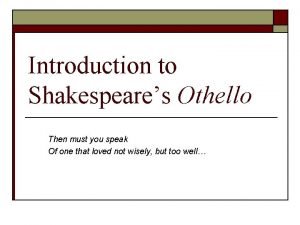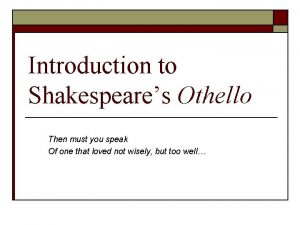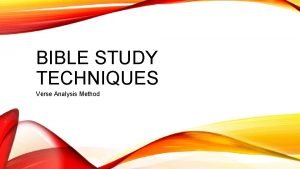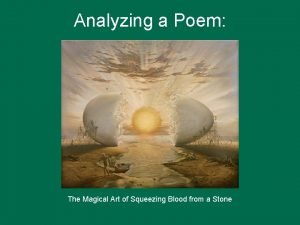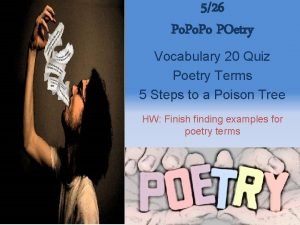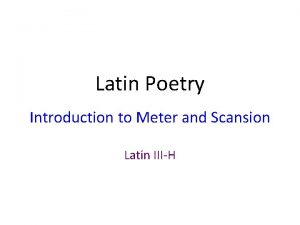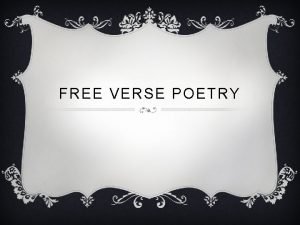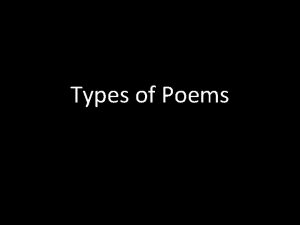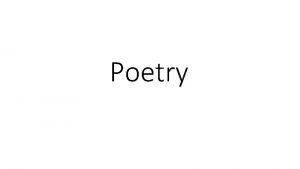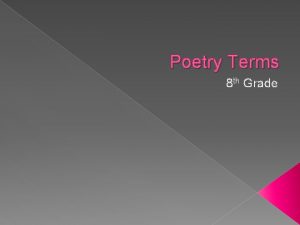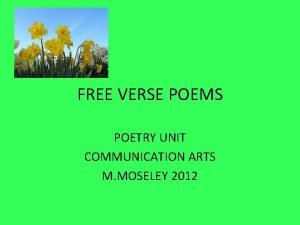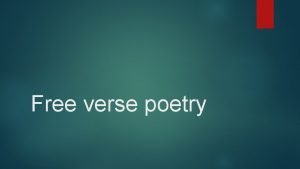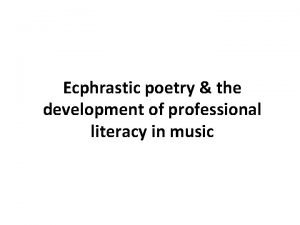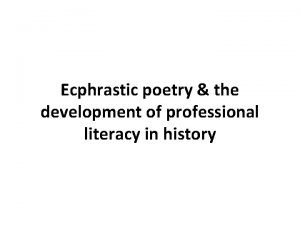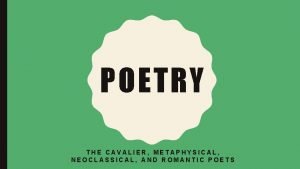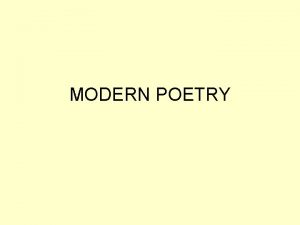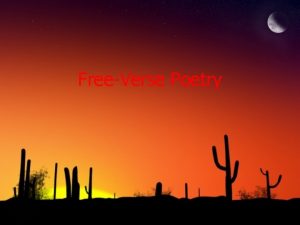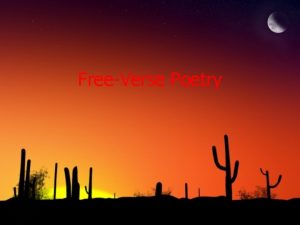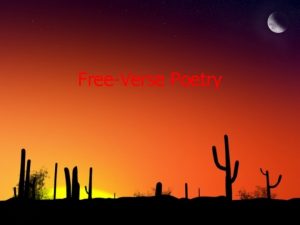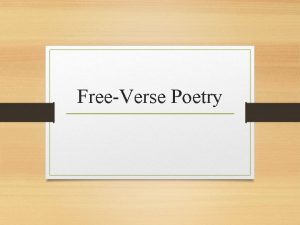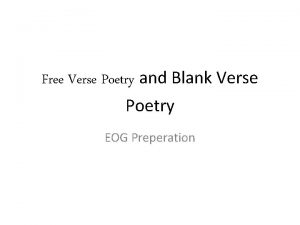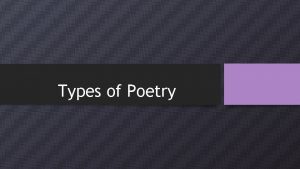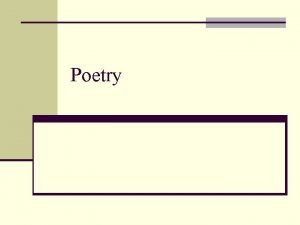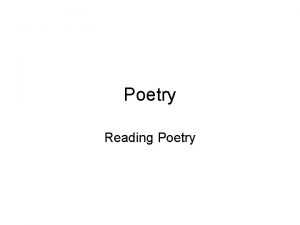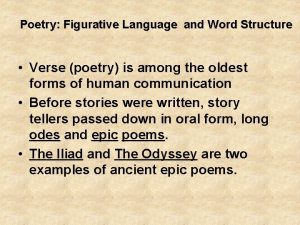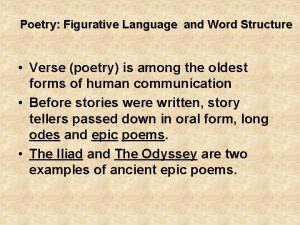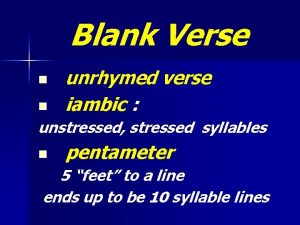FreeVerse Poetry What is FreeVerse Definition verse composed




















- Slides: 20

Free-Verse Poetry

What is Free-Verse? ◊ Definition: verse composed of variable, usually unrhymed lines having no fixed metrical pattern. ◊ While free verse poetry has no regular rhyme or rhythm, it can follow a pattern: - Two long lines and then a short one - Same number of lines in each stanza - Repetition of the same word to begin or end each stanza

Elements of Free-Verse ◊ Assonance ◊ Alliteration ◊ Imagery ◊ Onomatopoeia ◊ Cadence

Assonance ◊ The repetition of identical or similar vowel sounds • “The morning was cold with a bold statement. The morning dew was wet and set in the ground. You could taste the spring paste fill the air. It made you feel real, refreshed and lively.

Practice assonance ◊ Examine the picture on the right. Write a few lines describing what you see, using assonance

Alliteration ◊ The repetition of the same sounds or of the same kinds of sounds at the beginning of words or in stressed syllables • “Laura’s lizard likes leaping leopards. ” • “She sells sea shells by the sea shore. ”

Practice alliteration ◊ Last names ending in A-M: • Write a short description of a small child eating a melting ice cream cone, using alliteration. ◊ Last names ending in N-Z: • Write a short description of a bull rider getting ready to come out of the chute, using alliteration.

Share your work with a partner!

Imagery ◊ The use of vivid or figurative language to represent objects, actions, or ideas ◊ Using sensory language to create mental images “The air is crisp as I trudge home, to see palms on frozen glass. Watch as the darkness falls, across the snowy lane. ”

Practice imagery ◊ You have thirty seconds to view the picture on the following slide. Then, use imagery to re-create the scene in your own free-verse poem.


Onomatopoeia ◊ The formation or use of words such as buzz or bang that imitate the sounds associated with the objects or actions they refer to.

Practice onomatopoeia ◊ A poem titled “When Carly Eats Spaghetti” is on the following slide. As you read it, write down words that are examples of onomatopoeia.

“When Carly Eats Spaghetti” When Carly eats spaghetti, She chomps and gobbles and slurps, The spaghetti disappears with a whoosh Sauce slapping and smacking Round her chops. She scrapes the toast round the plate Crunching, grinding every mouthful. She burps, gurgles and leaves the table!

Cadence ◊ The rhythmic rising and falling of the voice when speaking or reading poetry. ◊ The structure of a the poem that emphasis’ words and/or phrases.



Examples of Free-Verse ◊ Walt Whitman- “Walt Whitman”

Examples of Free-Verse ◊ Dylan Thomas- “Do Not Go Gentle Into That Good Night”

Examples of Free-Verse ◊ Marianne Moore“The Fish”
 What is freeverse
What is freeverse Why is blank verse considered traditional
Why is blank verse considered traditional Free verse vs blank verse
Free verse vs blank verse Free verse vs blank verse
Free verse vs blank verse Prose and verse
Prose and verse Verse analysis
Verse analysis The magical earth poem
The magical earth poem Free verse vs blank verse
Free verse vs blank verse Latin scansion rules
Latin scansion rules Verse by verse poem generator
Verse by verse poem generator What is freeverse
What is freeverse Blank verse poems examples
Blank verse poems examples Ode poetry definition
Ode poetry definition Gymnastics poem
Gymnastics poem Free verse poem using figurative language
Free verse poem using figurative language Characteristics of free verse
Characteristics of free verse What this image
What this image Free verse poem kids
Free verse poem kids Metaphysical poetry characteristics
Metaphysical poetry characteristics Traditional poetry vs modern poetry
Traditional poetry vs modern poetry Short narrative or lyric poems
Short narrative or lyric poems
